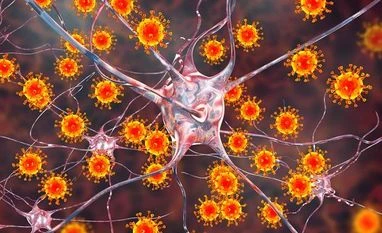A year after two north Kerala districts were hit by Nipah claiming 17 lives, the disease resurfaced in the state with a 23-year-old student here confirmed to be infected with the potentially deadly virus.
The government said 311 people from various districts with whom the student had interacted were under observation.
The results of blood samples of the student, which were tested at the National Institute of Virology in Pune, have confirmed Nipah, state Health minister K K Shailaja said here.
The result came this morning, she added.
Earlier, blood samples examined at two virology institutes--Manipal Institute of Virology and Kerala Institute of Virology and Infectious Diseases--had indicated Nipah.
The government said four people--three who attended to the student initially and one person who studied with him--were suffering from fever and sore throat.
More From This Section
They were shifted to the isolation ward set up at the Kalamassery Medical College Hospital here for a detailed medical examination.
Their health condition is satisfactory, according to authorities.
Shailaja said the condition of the student, who is being treated at a private hospital here, is stable and he was not put under any support system like ventilator.
"Good care is being given to the patient. The patient sometimes become restless due to fever...We expect a good result," she told reporters.
A bulletin issued by the government in the evening said a list of 311 people, who have interacted with the student, has been prepared and they were under medical observation.
The student hailing from North Paravur in Ernakulam district is studying in a college in Thodupuzha in Idukki district.
The student, who was suffering from fever, had gone to Thrissur district with a group of students to attend a training programme in Thrissur district.
The government urged people not to panic and take precautionary measures to prevent the spread of the disease.
"We have confidence that we can face it.We have faced it in Kozhikode last year and contained it," Shailaja said trying to instil confidence among people.
Chief Minister Pinarayi Vijayan said there was no need to panic as the health network would rise up to the challenge.
"We are in constant contact with the Union ministry for health. A team of experts have arrived in Kochi.Their guidelines will also be used to tackle the virus outbreak," Vijayan said in a Facebook Post.
Under the supervision of the state health minister, all necessary preparations have been completed, Vijayan said, adding those who came in contact with the infected person, have been traced and are under observation.
Extending all assistance to the state government to deal with the situation, the Centre rushed a six-member team comprising an epidemiologist to Kerala.
Union Health Minister Harsh Vardhan also spoke to Shailaja to discuss the current situation and assured all support from the Centre to the state.
A control room has also been set up and the Strategic Health Operations Centre (SHOC) of the National Centre for Disease Control (NCDC) has been activated, phone number for which is 011-23978046, a health ministry statement said in New Delhi.
According to state government figures, the Nipah virus had claimed 17 lives -- 14 in Kozhikode and three in neighbouring Malappuram in May last year.
Appealing to social media users not to spread panic among the public, Shailaja said stringent action would be taken against those indulging in such acts.
Leader of Opposition in the Kerala Assembly, Ramesh Chennithala, who met Shailaja here, promised all support to the state government to unitedly fight the disease.
Fruit bats of the Pteropodidae family are the natural host of the Nipah virus.
Nipah virus can be transmitted to humans from animals (such as bats or pigs), or contaminated foods and can also be transmitted directly from human-to-human.
On May 19, 2018, Nipah virus disease (NiV) outbreak was reported from Kozhikode.
Health experts from Kozhikode, who have experience in fighting the disease, have reached Kochi to assist the officials here.
According to the WHO, Nipah virus is a newly emerging disease that can be transmitted from its reservoir (natural wildlife host), the flying foxes (fruit bats), to both animals and humans.
It takes its name from Sungai Nipah, a village in Malaysia where it was first identified.
Symptoms range from asymptomatic infection, acute respiratory infection (mild, severe), and fatal encephalitis.
Infected people initially develop influenza-like symptoms of fever, headache, myalgia, vomiting and sore throat.
This can be followed by dizziness, drowsiness, altered consciousness, and neurological signs that indicate acute encephalitis.
Some people can also experience atypical pneumonia and severe respiratory problems, including acute respiratory distress.
Encephalitis and seizures occur in severe cases, progressing to coma within 24 to 48 hours.
)